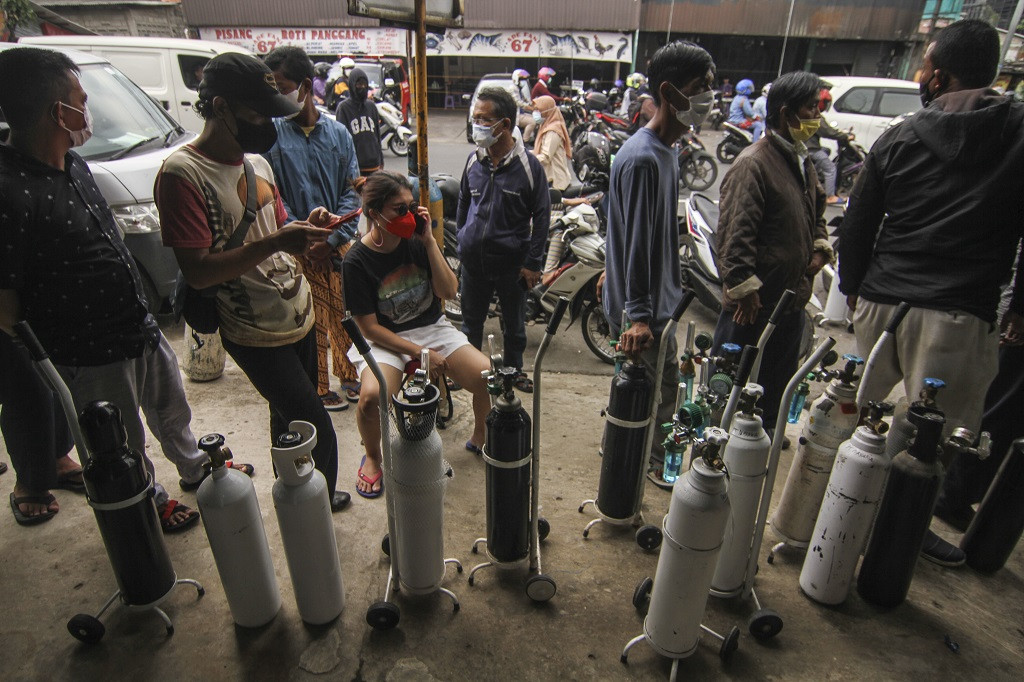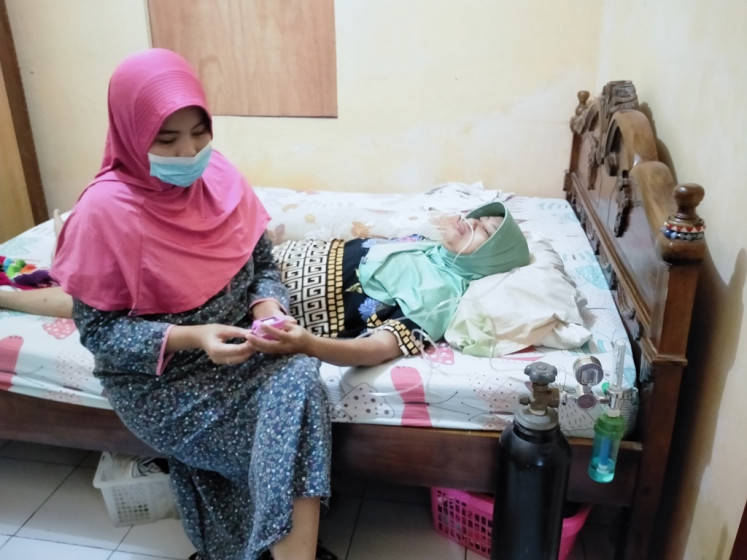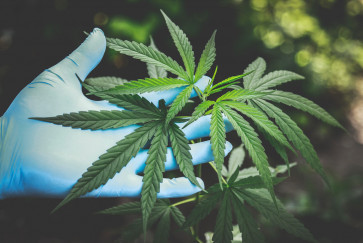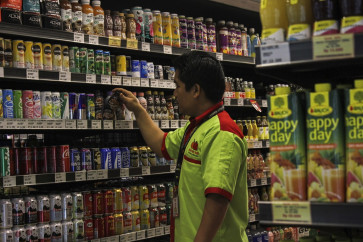Self-isolated coronavirus patients scramble for help
As hospitals across the country are overwhelmed with new COVID-19 patients, people undergoing self-isolation struggle getting treatment, medication and daily necessities.
Change text size
Gift Premium Articles
to Anyone

C
OVID-19 patients undergoing self-isolation are facing difficulties accessing the necessary medical resources and treatment as they are receiving little to no assistance from health authorities already overwhelmed with hundreds of thousands of other patients.
On June 24, Dwi Fahmi took his father Kamsari to Hermina Hospital in Kemayoran, Central Jakarta as he needed a dialysis procedure. But Kamsari had a slight fever that day, prompting the doctor to advise him to go home and wait to get better.
When the fever lasted for three days, doctors advised Kamsari to take a polymerase chain reaction (PCR) test. Unfortunately, the result came back positive the following day.
“My father was five days late for his dialysis, but he tested positive. The emergency unit of the hospital was full. When we got there, we saw six patients who had been waiting at the hospital for days for a bed and treatment,” Dwi told The Jakarta Post on Wednesday.
Since Kamsari needed his dialysis procedure immediately, Dwi scrambled to find any hospital that could provide it. He later found a Pertamina hospital in Simprug, South Jakarta was ready to provide dialysis for COVID-19 patients on June 29.
But the hospital had no available beds for new COVID-19 patients, forcing Dwi and Kamsari to go into self-isolation in their house afterward.
Read also: As cases swell in Indonesia, self-isolation is a luxury not everyone can afford
While self-isolating, Dwi helped his sister and mother to take care his father. They decided that Dwi would look for medical needs, while his sister and mother would be in close contact with Kamsari.
A few hours after the dialysis procedure, Kamsari's oxygen saturation level dropped, prompting Dwi to look for an oxygen tank, but they were in short supply and he could not find one anywhere.
“I eventually found one in Bekasi [in West Java] a day later. It was the only shop that sold [the tank] at a normal price. I bought their last tank,” Dwi said.
But on the morning of July 3, Kamsari became breathless. He died at 3 a.m. after five days of self-isolation. Kamsari was 59 years old.
The grieving family encountered further difficulties burying Kamsari. They asked a community health center (Puskesmas) in Kemayoran for burial assistance, but it never got back to them.
They eventually received assistance from their community unit (RW) leader to bury Kamsari in a nearby public cemetery under COVID-19 burial protocols.
Telemedicine to the rescue
Dwi and Kamsari were not the only family to struggle after being forced to self-isolate during Indonesia’s second COVID-19 wave.
Health authorities are reporting between 20,000 and 30,000 new cases every day, causing the country’s active case tally to skyrocket from 100,000 in early June to 367,733 on Friday. Most patients with moderate to severe symptoms need to be hospitalized.
Healthcare facilities and workers are overwhelmed with the high number of patients, forcing other patients to struggle at home.
Read also: COVID-19 deaths may surpass 100,000 without ‘drastic measures’: KawalCOVID-19
Fajri Adda’i, a general practitioner in a Puskesmas in Central Jakarta, said he had to call dozens of hospitals across the capital and broadcast requests for hospital beds to his colleagues in order to find available hospital beds for his patients.
“The number of patients is increasing more than the capacity of the hospitals. We need to prevent new infections,” he said on Thursday.
People in self-isolation are facing difficulties getting treatment, medication or daily necessities. Volunteer group LaporCOVID-19 reported on Thursday that at least 365 people had died from COVID-19 outside medical facilities since June.
To help patients in self-isolation, Health Minister Budi Gunadi Sadikin announced that COVID-19 patients with mild symptoms would be eligible for free telemedicine services and medication. The ministry worked with several digital health platforms for the free services.
Nearly 750 laboratories linked with the ministry will send a message with a link for free online consultation for anyone who tests positive for COVID-19. The medicine will be sent through courier services.
Apart from telemedicine, doctors at Puskesmas will also monitor patients in self-isolation through phone or video calls. Patients will also be given free medicine to ease their symptoms.
Should their condition worsen, the health center will find a referral hospital and pick up the patient by ambulance.
Read also: 'Puskesmas' move up to COVID-19 front lines amid overburdened health system
Local initiatives
When 30-year-old housewife Rita Octavia and her five family members tested positive for COVID-19, they were instructed by a nearby Puskesmas in Yogyakarta to undergo self-isolation. Doctors and nurses from the health centers monitored their health condition and provided free vitamin supplements and medicine for Rita's diabetic mother.
Her mother often has difficulty breathing and her oxygen saturation level can drop to 88 percent. A healthy person typically has an oxygen saturation level of at least 95 percent.

Rita often asks her brother, who lives separately, to refill the oxygen tanks, which is challenging as most refill centers have run out of oxygen. Fortunately, community initiatives such as Yayasan Untuk Teman (For Friends Foundation) provide information on refill centers across Yogyakarta.
While her brother drives around the city, Rita calls the stores one by one until she finally finds one that still has supplies.
Community initiatives have stepped up recently in providing additional help for people undergoing self-isolation, including the website wargabantuwarga.com, which collects data on available hospital beds, oxygen tanks and ambulances.
Read also: Soup kitchens spring up across Java amid latest COVID-19 restrictions
Musician Ananda Badudu, who started the website, said such initiatives provided what the government had not during the pandemic.
“The government is still in denial and underestimates [the pandemic] reflecting on public statements made by the officials. Therefore, we created this platform so people can help each other,” said Ananda.









